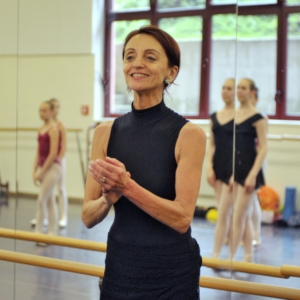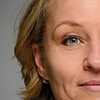Gabriele Haslinger – Former solo dancer at the Vienna State Opera, Ballet master/educationalist/teacher/coach
“When one door closes, another, much wider one opens.”
Gabriele Haslinger was 6 years old when she was accepted at the prestigious ballet school of the Vienna State Opera, 14 when she received her employment contract to the Vienna State Opera Ballet and 21 when Rudolf Nureyev (Soviet-born ballet dancer and choreographer, 1938 – 1993) specifically chose her of all ensemble members as his partner for a series of roles – at a time, when she had not even reached her soloist status yet. This was followed by dance partners like Sir Anthony Dowell CBE (retired British ballet dancer, former artistic director of the Royal Ballet), Kevin Haigen (American ballet dancer and educationalist) or Michael Birkmeyer (Austrian ballet dancer and choreographer) to name just a few. Gabriele was acclaimed for her virtuosity and elegance and for making the most technically demanding roles seem effortless and gracious. Little did she know that at the age of only 27, she would have to retire from her active stage career.
Untimely endings, the proverbial ‘closing doors’, were not uncommon in the life of Gabriele Haslinger, be it in her professional life or in her personal endeavours. Whenever there would have come the moment to finally enjoy the fruits of her efforts, she was actually not given an awful lot of time to glory in her achievements. Two failed marriages and a premature ending of her stage career as a ballet dancer are the most painful life events Gabriele had to experience. And yet she is convinced: “Ultimately, adversity has allowed me to have a more colourful, more diverse life.”
How did it all start? How did you get to ballet?
When it all started, I had never heard of ballet before. My parents had an inn, and I would intuitively begin to dance when the music box started to play. It was pure pleasure of movement, so my parents thought I would enjoy attending a dancing school for kids, which I did from the age of 3. At some point – I was then 6 years old -, my father heard that the ballet school of the Vienna State Opera was recruiting new students and suggested I should give it a go and attend the auditions.
I remember the day of the entrance exam as if it was yesterday: crowds of delicate girls with their beautiful tutus, already looking like little ballerinas – and then there was me in my bathing suit and plimsolls. I genuinely felt like the Ugly Duckling. And yet: after having been tested for suppleness, motional talent and musical sense, I was accepted, and a whole new world opened up. I can really say that my life actually happened to me.
Why the incredibly early retirement from your active stage career?
I was still part of the Corps de ballet – the ’background dancers’ if you will -, when Rudolf Nureyev requested me for “The Flower Festival in Genzano”, “Don Quixote”, and other ballets. From then on, solo parts were my ‘new normal’ in addition to my duties as member of the Corps de ballet and some half-soloistic roles. This made my workload more than intense, and as much as I enjoyed it, it started to take its toll on my body. The first signs of degeneration of my tendons became noticeable, and once the problems started, it was getting harder and harder to keep my top form or to get back into form after an injury. However, I saw this as ‘my time’, ‘my moment’ – just like an athlete would see the Olympic Games. And the Olympic Games are not the moment to give up …
As a result, for a couple of years – I had then already been promoted to soloist -, my everyday reality was characterised by injuries, surgeries, plaster casts, cortisone treatments and rehabilitation programmes. It was a circle of despair and hope, resumption of training and return to the stage – until the next troubles, the next series of treatment, the next mandatory break. I underwent not less than 14 surgeries which left their marks and made me vulnerable to accidents – among others, a rupture of my Achilles tendon in the middle of “Swan Lake”, on stage.
How did you handle these setbacks?
I guess, I did not ‘classify’ them as setbacks in the first place. My question was never “Why me?”. My first question would instinctively be: “What can I do now?” And then: “What can I do to get back on stage?” I try to focus on the positive, my accomplishments and successes – and not the things I missed out on. It needed some time to acquire this viewpoint, and I also had my low moments. However, I’ve found that I can mobilise enormous strength reserves when I think I’m completely devastated. When you hit rock bottom, the only way is up.
Another very important aspect is to be surrounded by people who honestly care about you – as a person, a human being, not only as “the dancer” – or whatever it is that you are doing. I had the enormous blessing to have such people around me: family, friends, teachers, colleagues. Those whose first question would not be “When will you resume your training?” but “How are you feeling?”.
What was the driving force in your life, the characteristic that kept you going?
One of my main motivations was certainly not to disappoint but to fulfill the supposed expectations of others: those of my parents, my teachers, the audience. What helped me was discipline and a certain rigour against myself. It was only later in life that I learned to listen to my own needs and to simply enjoy more.
You eventually changed to the teaching side of ballet. How has your life changed from stage dance to instructing?
It has changed immensely. Above all, because I had the feeling that I had not been able to enjoy my own career long enough. Also, because I did not get to choose; I simply was not fit for an active stage career anymore. It felt as if my purpose, my identity, my routine had been taken from me. In my beginnings as a ballet teacher and coach, I very much bemoaned my fate. These young ballet students did what I still wanted to do myself: being on stage, being a dancer and sharing my passion and talent with the world. And although I never let them feel my reservation, it took me a long time to take pleasure in teaching and sharing my knowledge and know-how with those who would then be successful on stage. Today, I see it as an absolute privilege to accompany and coach these young talents. And I genuinely enjoy the part that I as a ballet master am able to play in their success.
I retired my second career as a ballet educationalist at the ballet school of the Vienna State Opera in 2014 after 27 years to enjoy more freedom and flexibility in my activities – and also to escape the enormous pressure I put on myself. Since then, I have continued to teach. At ballet academies, conservatories, in workshops and private lessons. Beautiful things come to me – among others the participation in ballet competitions as a jury member -, and I am enchanted by the requests and chances I get, giving me a sense of purpose, a feeling of being needed and appreciated.
If you had to tell your life in form of a ballet or a dance – which one would it be?
Without a doubt „La Serenade” by George Balanchine to Tchaikovsky’s Serenade for Strings, which happens to be my favourite ballet. There is no predetermined story line, which allows for dreaming and imagination. For me, it embodies every feeling you can possibly have; the beautiful music flows and carries you like waves, up and down, just as in life. I see a lot of analogies to my own story.
Would you say that dance is a ‘universal language’?
Absolutely. I would even say, dance unites cultures. In dance and music, there are no borders or barriers, regardless of one’s language, origin or social background. For these reasons alone I would always promote dance. I always found it fascinating to watch students coming from all corners of the world interact and communicate through dance. They don’t look at what separates them, they focus on what unites them. In ballet, words are translated into movements, and everyone has their own lyrics. They don’t need their language to express feelings – they can use dance to say it all.
When you look back at your career – how do you see all those blows of fate today?
Had my career continued in an ideal way, I would certainly have enjoyed more dancing, more wonderful moments on stage, more opening nights, “Swan Lakes” and “Nutcrackers” – and extended my career as long as I possibly could. And yet ultimately, my injuries have forced me to explore other routes and allowed me to experience new territory. I would even go so far as to say that I would probably have missed the moment to have children (editor’s note: Gabriele has two adult sons), had everything gone according to the ‘world of ballet’. So, for sure, my setbacks have given me a lot of gifts and made me the person I am today.
And I know, after all, I am a darling of fortune!
(published 24th September 2019)


